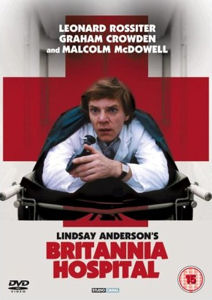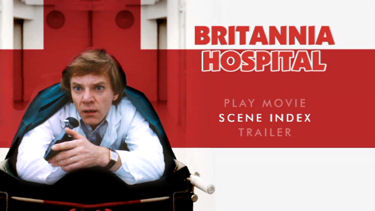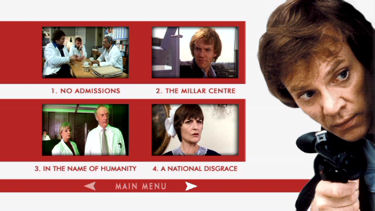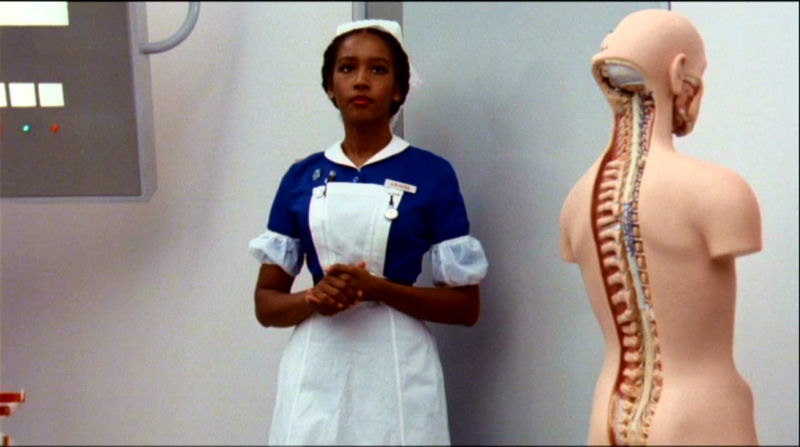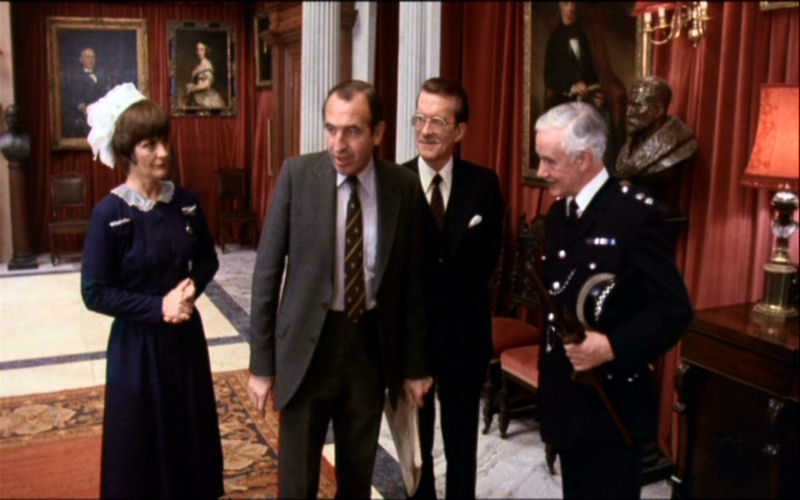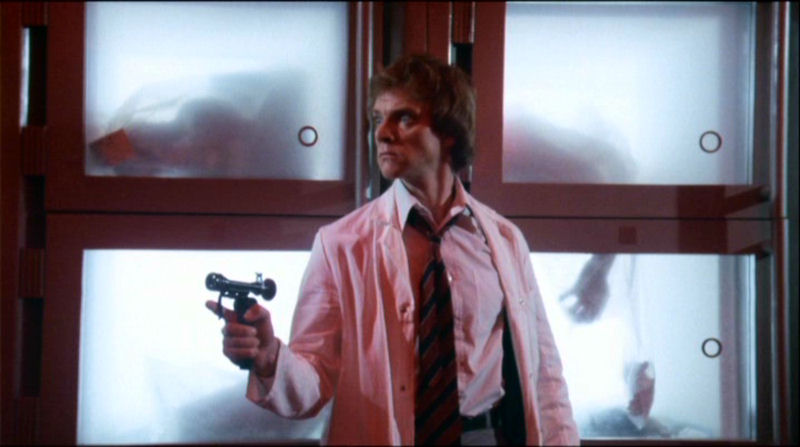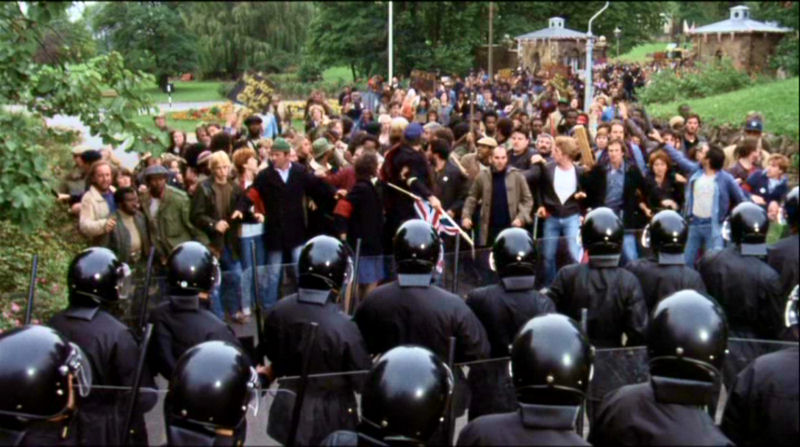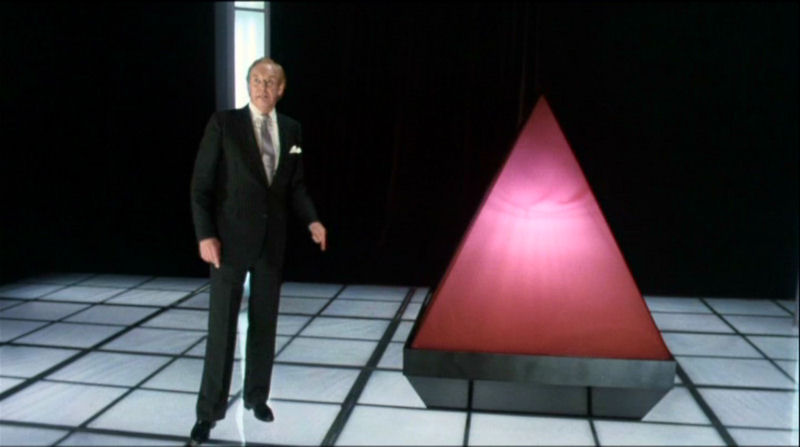![]()
![]()

![]()
![]()

directed by Lindsay Anderson
UK 1982
Whilst it may lack the iconic vitality
of 'If….' (1968) or the cinematic daring of 'O Lucky Man!'
(1973), Lindsay Anderson’s 'Britannia Hospital' (1982) should
nonetheless be regarded as highly as its well-received predecessors in
the 'Mick Travis' trilogy. However, from its première at Cannes – which
witnessed a walk-out by British critics – to the present day, opinion
has generally been slanted against this sideswipe at Thatcherite
Britain. Does this opinion fail to notice the powerful moral questions
that lie beneath 'Britannia Hospital''s caustic exterior? Or does
it choose to ignore them?
It is likely that people have been swayed by the surface qualities of
the film; many of which seem designed to ostracize the casual viewer.
Not only is the popular Mick Travis (Malcolm McDowall) a peripheral
figure (in comparison to his central roles in 'If....' and 'O
Lucky Man!'), but also 'Britannia Hospital' eschews the subtle
humour of its forerunners in favour of lurid silliness and
near-slapstick. Further, the ultra-gory experiments conducted by the
hospital's resident Frankenstein, Professor Millar (Graham Crowden), are
fodder only for the midnight movie crowd.
However, perhaps the feature of the film which most alienates the crowds
is its seemingly cynical and unforgiving portrayal of humankind as a
whole. 'Britannia Hospital''s overarching plot – which sees the
titular establishment (acting as a microcosm for all of Thatcherite
Britain) descend into conflict and madness, as 'haves' and 'have-nots'
clash over healthcare – enables Anderson and his screenwriter, David
Sherwin, to attack groups from across all of the political and social
spectra. Both hospital workers and public figures, alike, are portrayed
as being capable of cruelty, and thus almost no-one is spared Anderson's
wrath.
But, at the same time – and this is crucial – almost no-one is spared
Anderson's compassion. It is this fact that prevents 'Britannia
Hospital' from being the exercise in rampant cynicism that many believe
it to be. The film recognizes that just as anyone, from any background,
can be cruel, so too can anyone be a victim of cruelty. Accordingly,
then, there are numerous scenes in which Anderson elicits our sympathy
for his subjects, regardless of their place on the social ladder – for
example, when left-wing demonstrators are brutally clubbed, or when the
hospital's wealthy patients are refused treatment. These scenes are
distinguished by emotive, Fordian close-ups of the victimized; close-ups
which – as well as recalling the tenderness of earlier Anderson films
such as 'Thursday’s Children' (1954) and 'Every Day Except Christmas'
(1957) – serve to individualize the crowds. The message is almost
Biblical: people persecute as groups but suffer as individuals. And so
Anderson's true target becomes apparent: all organizations, classes,
groupings and institutions which stand as a barrier to true human
fellowship and understanding. Individuals deserve sympathy and
forgiveness, whilst organizations do not; and herein lies the film's
anarchism.
However, there is perhaps one individual who is beyond forgiveness:
Professor Millar, a latter-day Hitler who cloaks his plans for genocide
– the replacement of brains with silicon chips; of humans with machines
– in the language of science and progress. When his mysterious 'Genesis'
project is unveiled at the film's astonishing climax, its mechanistic
rendition of the “What a piece of work is man...” speech from Hamlet
belies a single truth: no machine can ever truly replicate human soul or
human artistry. In comparison to such monsters, humans are of almost
limitless potential; yet – as the film's previous scenes have made clear
– humankind needs to refine its methods of interaction in order for such
potential to flourish. Rarely has cinema achieved so pure a humanism or
made so momentous a statement.
With its more considered world-view, 'Britannia Hospital'
actually surpasses 'If....' and 'O Lucky Man!' in many
respects, and represents the culmination of a near-lifetime’s worth of
critical and intellectual engagement with the world on the part of
Lindsay Anderson. Given this, the negative popular response to the film
may well have been shattering for him as well as for his career (Derek
Jarman predicted that Britannia Hospital “would finish Lindsay in the
British film industry”). And indeed, soon after the film's short-lived
release, Anderson was to scribe these despondent words in a letter to
Malcolm McDowall:
“I've been back in London – how long? - about three or four weeks ...
Time is rather featureless at the moment. I'm sure you'll understand
when I say it's a dispiriting place to return to. The dark waters have
closed over 'Britannia Hospital'”
Thankfully, 'Britannia Hospital''s ready availability on DVD
means that the “dark waters” can finally recede: the time has come for
revaluation.
Posters
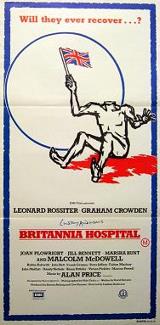 |
 |
.jpg) |
Theatrical Release: May - 1982 - Cannes Film Festival
Reviews More Reviews DVD Reviews
DVD Review: Cinema Club/Studio Canal - Region 2 - PAL
| DVD Box Cover |
|
CLICK to order from:
|
| Distribution |
Cinema Club/Studio Canal Region 2 - PAL |
|
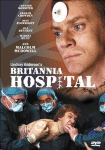 |
Anchor Bay also released an NTSC version in Region 1. It is available to be purchased here: | |
| Runtime | 1:51:32 | |
| Video |
1.85:1 Original Aspect Ratio
16X9 enhanced |
|
|
NOTE: The Vertical axis represents the bits transferred per second. The Horizontal is the time in minutes. |
||
| Bitrate |
|
|
| Audio | English (Dolby Digital 2.0) | |
| Subtitles | None | |
| Features |
Release Information: Studio: Cinema Club/Studio Canal Aspect Ratio:
Edition Details: Chapters 18 |
|
| Comments: |
This Region 2 Cinema Club release
features a clean, anamorphic transfer – with no obvious digital
artifacts or print damage – which enables 'Britannia Hospital''s
Hammeresque colour-scheme to fizz off the screen. If there is
one problem with the transfer, it is a general lack of detail,
but this in no way detracts from a viewing of the film.
However, all is not positive: the DVD inexplicably comes without
any subtitles, and the extras have been limited to a single
theatrical trailer. |
DVD Menus
|
|
|
Screen Captures
|
|
|
|
|
|
|
|
|
|
|
|
| DVD Box Cover |
|
CLICK to order from:
|
| Distribution |
Cinema Club/Studio Canal Region 2 - PAL |
|
 |
Anchor Bay also released an NTSC version in Region 1. It is available to be purchased here: | |
![]()
![]()
![]()
![]()
